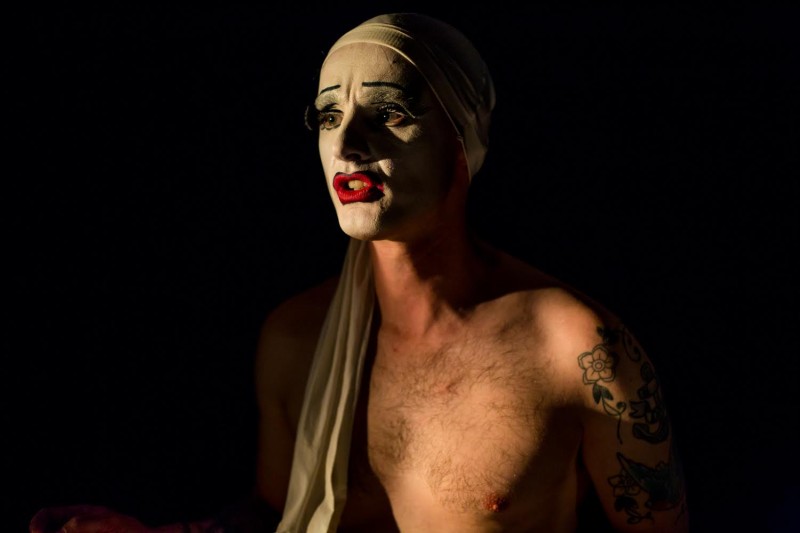 Dickie Beau, a ‘drag fabulist’ and ‘playback pioneer’, was among the opening shows of this year’s Mayfest. Taking the main stage at Bristol Old Vic, Blackouts was an audiovisual spectacle layering projection, performer and rare mesmerising tape recordings of Marilyn Monroe and Judy Garland.
Dickie Beau, a ‘drag fabulist’ and ‘playback pioneer’, was among the opening shows of this year’s Mayfest. Taking the main stage at Bristol Old Vic, Blackouts was an audiovisual spectacle layering projection, performer and rare mesmerising tape recordings of Marilyn Monroe and Judy Garland.
The show opens with a passionate recording of Judy Garland. ‘You can’t make me sing!’ She exclaims at a man trying to get her to go to her own concert. Strongly lit with bright white light Dickie Beau delivers her words, his lips curling outwards, his expression shaping our memory of her face. Dickie Beau’s lip syncing skill and physical attributes are powerfully engaging, completely absorbing you into the words of the tape recordings. His whole body stutters and flows with the tape, as if he himself is being ‘played’.
The words of Judy bring up the trappings of fame, the struggle to maintain your own life whilst fulfilling an idol persona. For me, it brought out thoughts on the sacrificial. The idols become false beacons of society, created to be fantastical and higher so we can watch with awe.
Solely using the words of the idols, the piece is a clever construction about construction, and more specifically the construction of portraits. Dickie draws a parallel between himself and the journalist Richard Meryman, who developed a style of writing which imitated the speech pattern of those being interviewed, Marilyn being one of them, and this became his shtick. The practice of drag can be seen as the creation of an animated portrait, taking skill in imitation with accuracy. Dickie Beau is extremely captivated by this parallel between his own practice and that of Richard Meryman, presenting him as a kind of future self, but in the past.
A translucent but visible projection screen veiled the whole stage giving a sense of looking into a memory or dream, an uncertain world spanning and merging decades with words and images recorded, copied, and performed. The projections sometimes aided this but sometimes interrupted the already rich flow of Dickie Beau and the tape recordings. An image that will stay with me is Marilyn’s floating white dress taken into surreal realms; a man’s tattooed body in white silk, blonde hair like straw, spinning in a whirlwind of dust, like an arrow being shot into the sky, her expression teetering between ecstasy and pain, a kind of idolised organism that had no end.
In the last moments of the piece, we hear a sound extract from Paris is Burning, a seminal documentary on the 80s drag balls and developing transgender culture in New York. The wisdom of senior drag queen Dorian Corey lulls out softly ‘You’ve made a mark on the world if you just get through it’, wrapping the piece back up with visions of drag culture and the constant interplay of reality and fantasy involved in the creation of ourselves, of our own self portraits.
A heavily self referential work, the performance was a complex psychological endeavour to grapple with the very practice of idols, idolising, and imitation. This created a kind of puzzle block of a show, a feeling from me in the audience of trying to ‘unlock’ it, trying to piece together the strands. This meant I struggled to emotionally connect but was taken aback by the richness of material, the potency of the images created and Dickie Beau’s transformative performance. Blackouts is a beautifully crafted and historically layered theatrical work that unravels in your mind afterwards.
